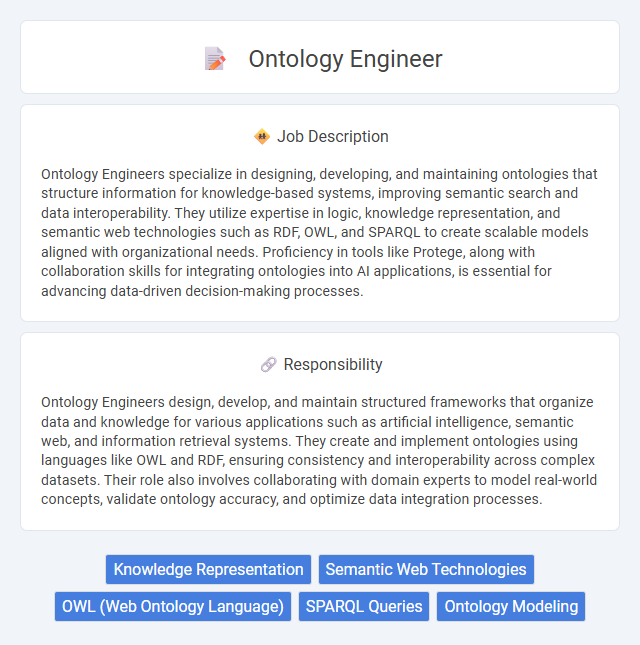
Ontology Engineers specialize in designing, developing, and maintaining ontologies that structure information for knowledge-based systems, improving semantic search and data interoperability. They utilize expertise in logic, knowledge representation, and semantic web technologies such as RDF, OWL, and SPARQL to create scalable models aligned with organizational needs. Proficiency in tools like Protege, along with collaboration skills for integrating ontologies into AI applications, is essential for advancing data-driven decision-making processes.
Individuals with strong analytical skills and a passion for knowledge representation are likely suitable for an Ontology Engineer role. People who enjoy working with complex data structures and semantic technologies may find this job fulfilling. Those lacking interest in meticulous data organization or abstract thinking might face challenges adapting to this position.
Qualification
Ontology Engineers require a strong background in computer science, knowledge representation, and semantic web technologies such as RDF, OWL, and SPARQL. Proficiency in programming languages like Python or Java, combined with experience in designing and managing ontologies for data integration and AI applications, is essential. Advanced degrees in fields such as information science, linguistics, or artificial intelligence further enhance qualification for specialized ontology engineering roles.
Responsibility
Ontology Engineers design, develop, and maintain structured frameworks that organize data and knowledge for various applications such as artificial intelligence, semantic web, and information retrieval systems. They create and implement ontologies using languages like OWL and RDF, ensuring consistency and interoperability across complex datasets. Their role also involves collaborating with domain experts to model real-world concepts, validate ontology accuracy, and optimize data integration processes.
Benefit
Ontology Engineers likely experience benefits such as enhanced career opportunities due to growing demand in AI and data integration fields. They might gain expertise in semantic technologies, which can improve job security and salary prospects. Working on cutting-edge projects may also increase professional satisfaction and skill development.
Challenge
Ontology Engineer roles likely involve tackling complex data representation and integration challenges within diverse systems. Navigating ambiguous or incomplete information could pose significant difficulties, requiring advanced problem-solving skills and innovative thinking. The probability of encountering rapidly evolving domain requirements may demand continuous learning and adaptation to emerging technologies and methodologies.
Career Advancement
Ontology engineers specialize in designing and managing complex knowledge models that improve data integration and AI applications across industries. Career advancement opportunities include transitioning to senior roles such as Lead Ontology Engineer, Knowledge Architect, or Chief Data Scientist, often involving leadership in semantic web initiatives and AI strategy development. Gaining expertise in machine learning, natural language processing, and domain-specific ontologies significantly enhances prospects for higher-level positions and cross-disciplinary collaboration.
Key Terms
Knowledge Representation
Ontology Engineers specialize in designing and implementing structured knowledge representation models that enable machines to understand and process complex information. They develop ontologies using formal languages such as OWL (Web Ontology Language) and RDF (Resource Description Framework) to create semantic frameworks that support data interoperability and reasoning. Their expertise facilitates advanced applications in artificial intelligence, natural language processing, and semantic web technologies by organizing domain-specific knowledge into formalized, computable formats.
Semantic Web Technologies
Ontology Engineers specialize in designing and implementing ontologies using Semantic Web technologies such as RDF, OWL, and SPARQL to structure and link complex data across diverse domains. They leverage knowledge representation, inference engines, and linked data principles to enhance interoperability, data integration, and intelligent information retrieval. Expertise in semantic modeling and ontology lifecycle management is essential to support AI, knowledge graphs, and advanced semantic search applications.
OWL (Web Ontology Language)
Ontology Engineers specialize in designing and implementing knowledge representations using OWL (Web Ontology Language) to create complex, machine-readable semantic models. They develop ontologies that enable effective data integration, semantic querying, and reasoning across diverse information systems. Mastery of OWL is essential for encoding domain knowledge, enabling automated inference, and supporting AI-driven applications.
SPARQL Queries
Ontology Engineers specialize in designing and developing semantic frameworks that enable structured knowledge representation using OWL and RDF standards. Expertise in crafting precise SPARQL queries is essential for extracting, manipulating, and reasoning over complex interconnected datasets within graph databases. Proficiency in query optimization techniques ensures efficient data retrieval and supports advanced applications in artificial intelligence, data integration, and knowledge management.
Ontology Modeling
Ontology Engineers specialize in ontology modeling to create structured frameworks that represent knowledge domains with precision and clarity. They develop, implement, and maintain ontologies using tools such as Protege and OWL to enable seamless data interoperability and semantic integration. Expertise in description logics and knowledge representation languages is essential to ensure accurate conceptualization and reasoning within complex systems.
 kuljobs.com
kuljobs.com